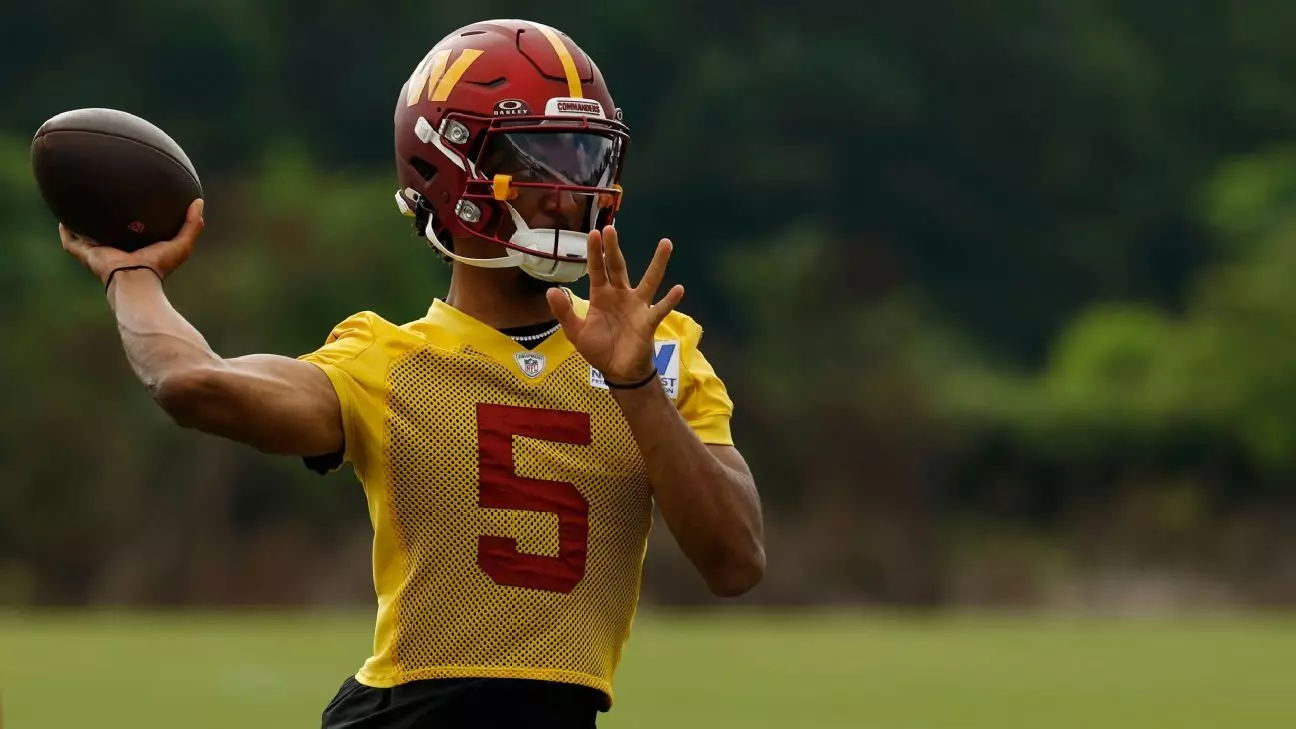In the fiercely competitive world of professional football, the journey from raw talent to seasoned leader is often marked by relentless growth and the courage to evolve. Jayden Daniels exemplifies this transformation, demonstrating that true leadership emerges not merely from talent but from a deep understanding of oneself and the game. His statements reveal that what once was a novice trying to find his footing has now matured into a quarterback who commands respect both on and off the field. This evolution isn’t accidental; it’s the result of deliberate effort, increased familiarity with his system, and the confident assertion of authority. Daniels acknowledges the stark difference between his rookie season and now, emphasizing how familiarity with offensive schemes and comfort within the team dynamic accelerate his growth.
What makes Daniels’ case remarkable is his acknowledgment of the past struggles and current confidence. Last year, he was focused on learning the intricacies of Kliff Kingsbury’s offense and adapting to the NFL pace. Today, he recognizes that he possesses a different set of tools, allowing him to read defenses better, execute plays more efficiently, and, crucially, lead his team with conviction. This shift from being a learner to a leader underscores the importance of experience in shaping a quarterback’s mindset. It is natural for rookies to grapple with the complexities of professional football; what distinguishes successful ones like Daniels is their willingness to grasp these lessons and use them as stepping stones to authority.
Confidence Breeds Leadership: A Game-Changing Attitude
Leadership in football isn’t just about making big plays; it’s also about setting standards and holding teammates accountable. Daniels’ recent actions, such as correcting teammates during practice and even ejecting a player for a false start, mirror a newfound assertiveness that signals a shift in his role within the team hierarchy. Such moments are not trivial—they reflect a mind that’s thinking beyond individual performance and focusing on collective excellence. Austin Ekeler’s praise for Daniels illustrates that the quarterback’s increased comfort level translates into peer recognition and respect.
Daniels himself understands his responsibility. His statement about the need to uphold standards and his willingness to hold himself accountable demonstrate a maturity that often takes years to develop. This is a clear departure from last year when the focus was solely on mastering the playbook. Now, Daniels sees leadership as an integral part of his identity within the team. This transformation is crucial because it aligns his personal growth with team success, fostering a culture where accountability becomes second nature.
The Role of Comfort and Experience in Unlocking Potential
What explains this meteoric rise from rookie jitters to commanding presence? Much of it can be attributed to familiarity—the more a quarterback understands his system and the players around him, the more confident and decisive he becomes. Coach Dan Quinn’s remarks highlight this phenomenon, noting that Daniels’ processing speed has improved dramatically, rendering him nearly immune to deception by defensive looks. This mental sharpness translates into better decision-making and a more commanding presence on the field.
Moreover, this confidence isn’t born out of arrogance but from genuine understanding and practice. The ability to analyze defenses quickly and adapt protections and plays accordingly elevates Daniels from a promising talent to a formidable leader. It also demonstrates that experience—whether gained through game reps, practice repetitions, or studying film—is the most valuable currency in the NFL. For Daniels, every snap, every play has contributed to his growth, transforming him from a rookie into a quarterback who reads the game with authority.
The Power of Growth Mindset in Shaping Future Success
Daniels’ journey underscores the importance of adopting a growth-oriented mindset. His willingness to learn, accept feedback, and push beyond comfort zones forms the foundation of his evolving leadership style. The NFL is a league that rewards resilience and adaptability, and Daniels exemplifies these qualities. His evolution reflects a conviction that mastery isn’t static but a continuous pursuit.
This mindset has tangible consequences. As Daniels emphasizes, he understands that developing confidence and leadership isn’t a matter of overnight change but a continuous process. The fact that he’s actively implementing leadership actions—such as correcting teammates on the field—indicates he’s embracing his role not just as a player but as a central figure in the team’s success story. His example sets a compelling precedent for other young athletes: growth is possible through dedication, self-awareness, and a willingness to accept responsibility.
In the competitive landscape of the NFL, where confidence and experience often decide games, Daniels’ transformation offers a blueprint for emerging talents. His story proves that the journey from a rookie to a leader is rooted in understanding, accountability, and an unyielding desire to improve. This evolution isn’t just about personal achievement; it’s about elevating an entire team to new heights.


Leave a Reply